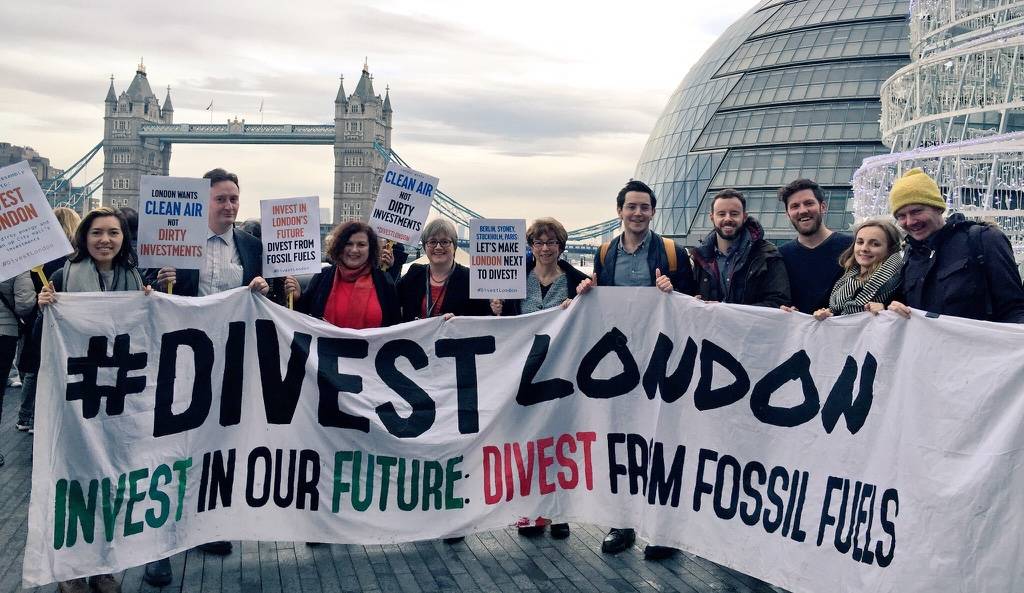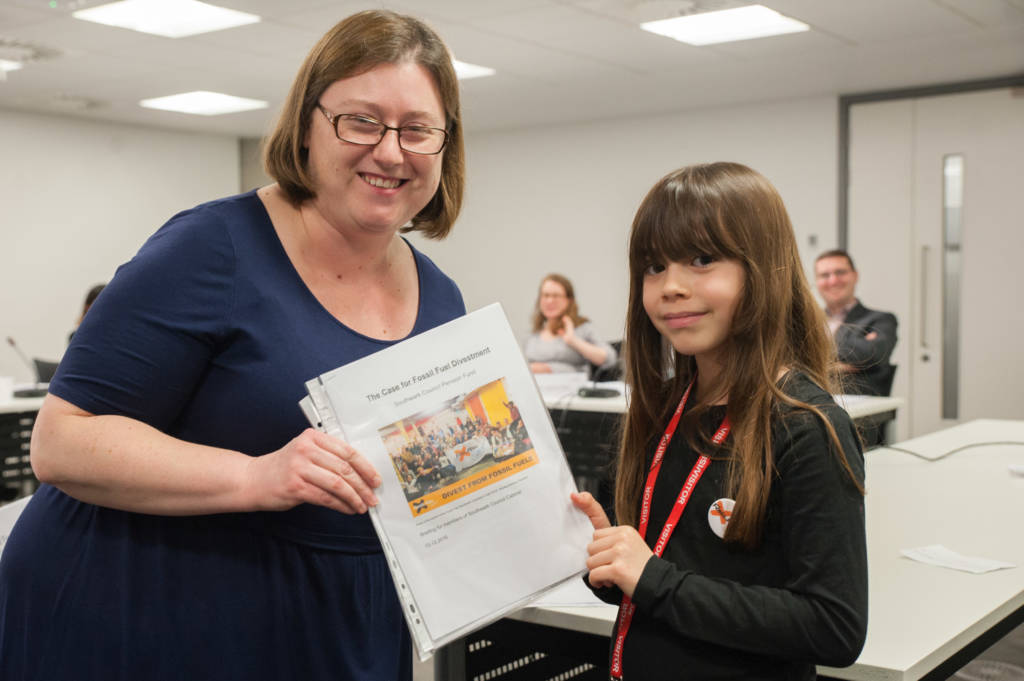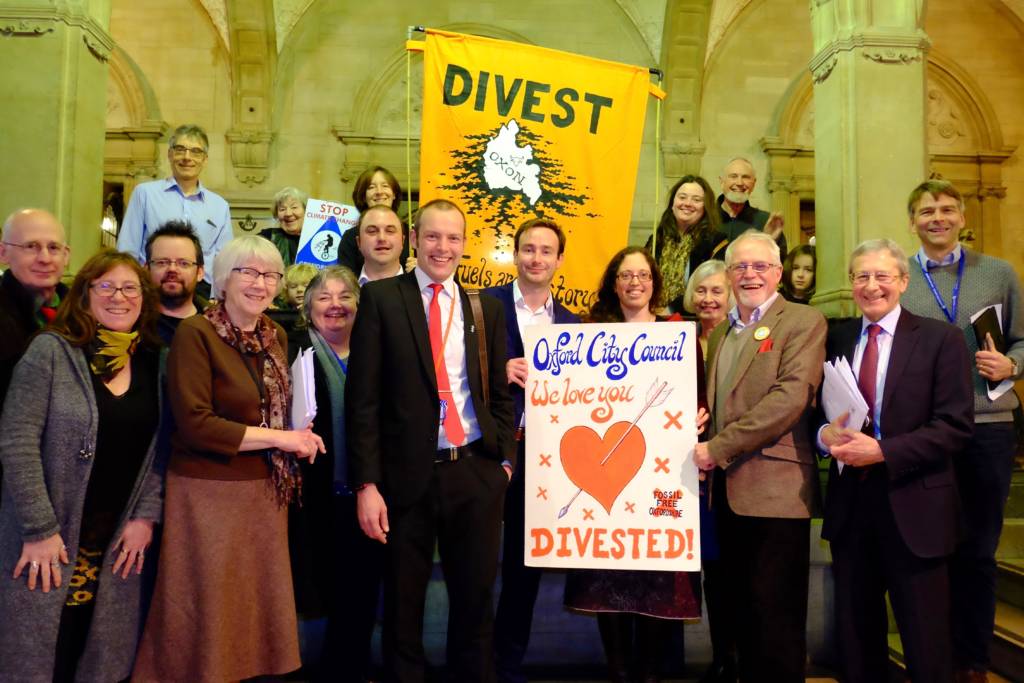There’s not long to go now until the local council and regional mayor elections on May 4th and the candidates have now been announced – exciting! This is a great opportunity to get divestment on the agenda of local decision-makers and influential figures, and win some local allies.
Want to get divestment on the election agenda in your local area? Here’s some top tips on how to engage…
Step 1 – Find out where is up for election

Divest London with Assembly Members after passing a motion at City Hall
Which wards, districts and councils are up for election? Are there any other votes happening as well, like mayoral elections?
You can find a full list of councils where elections are happening here. Once you’ve checked there are elections happening where you are, you can find the list of wards/divisions and see which one you live in – this information will be available on your council website (often under the ‘your council’ section).
Step 2 – Find out who is standing for election
The latest that the list of candidates can be announced is April 5th in England and Wales or March 29th in Scotland. The easiest way to find the list of candidates once it’s been published will be via your council website or simply by googling ‘council election candidates council name’. The details will most likely also be published in your local newspaper. If you live in Scotland, you can identify your local candidates with this online tool.
Once you’ve got a list of candidates, it’s time to start finding their contact details. If they’re existing councillors, this information will be on the council website. If they’re not, check their political party websites or try googling their name or searching for them on Twitter.
Step 3 – Email the candidates asking them to pledge to support divestment

Fossil Free Southwark lobbying their councillors
Once you’ve found the candidates’ contact details, why not shoot them an email asking them to pledge their support for divestment? Check out this template email for some inspiration.
Some things to include in your emails:
- A link to our council election divestment briefing – this short (4 page) PDF runs over the arguments for divestment and offers some ideas of ways councillors can show their support. Scottish campaigners can check out the Reinvest Scotland briefing.
- An ask to publicly pledge their support
- Make sure to mention that you are one of their constituents
This can be pretty tedious, so why not throw an election hackathon party with your campaign? Sit down for a few hours together with some friends, some biscuits and a template email, and fire them out!
Step 4 – Tweet at the council candidates
Lots of councillors and candidates will have their own Twitter accounts – this acts as their public face and a way for them to interact with their constituents. It’s also a quick and easy way for public figures to offer opinions or make statements – so why not tweet at the candidates asking if they support divestment, or linking to your resources?
If you get a positive response, make sure to retweet it, and then follow it up (see Step 6)!
Want to create a social media storm? Here’s some useful tools:
- Twitter tips for beginners – some handy hints on how to use Twitter.
- Click to Tweet – compose a tweet, give others the link, they share your tweet! Particularly useful if you want lots of individual messages sent to target.
- Thunderclap – compose a tweet, others agree to send it out at a specific time, boosting the impact.
Step 5 – Attend local election hustings and get divestment on the agenda
There are hustings for councillors and mayoral candidates happening across the country in the next month. These offer a great opportunity to meet candidates in person, raise the profile of your campaign, and win some allies publicly.
Find a hustings near you – check out this crowdsourced list of where and when they’re happening
Friends of the Earth Scotland has put together a couple of ideas for questions to ask at hustings, here’s some more tips:
- Make your questions specific to the local area – quote our data project, or talk about local climate impacts, for example
- Keep it friendly! Many candidates won’t have heard about your campaign, so try not to be too accusatory in your questions
Step 6 – Work with your allies

Fossil Free Oxfordshire thank Oxford Council for their divestment decision
Once you find some friendly councillors, it’s time to think about how you can work together to push divestment up the council agenda. Offering potential candidates support during election campaigns could be a powerful way to build allies for after the election.
At a bare minimum make sure you keep in regular contact with your newfound allies and follow up on pledges and statements that they make. You could also put together a press release for your local newspaper and get your new allies to give you a quote, or even organise a photo opportunity with your campaign and the candidates.
Warning! Beware party politics!
An important thing to bear in mind is the political make-up of your council. Which political parties have influence and power? It might be worth thinking about targeting the council candidates most likely to win in May, rather than just going for the ‘easy targets’.
If your campaign is seen as too partisan, this could backfire and lead to councillors from other parties being turned off. Working in a cross-party way (and encouraging councillors to do the same) could be
Step 7 – Go out and vote!
So you’ve been running a great campaign and have built lots of alliances with potential councillors – don’t forget to go out and actually vote for them on May 4th!
Make sure you’re registered to vote or you’ll get turned away at the polling station – the deadline to do so is April 13th in England and Wales, or April 17th in Scotland. If you’re not sure whether you’re registered, just re-register to be doubly sure. Click here to register to vote – it only takes a few minutes!